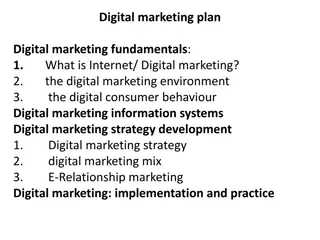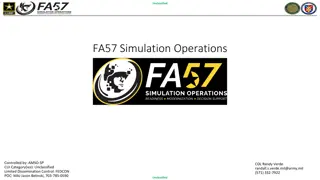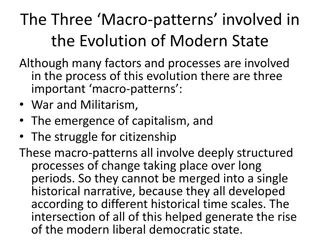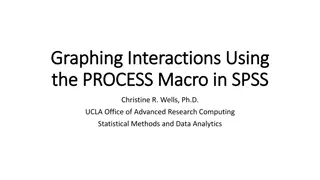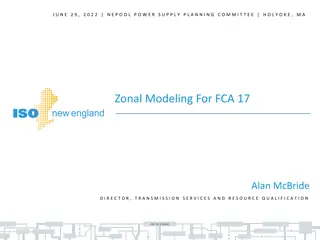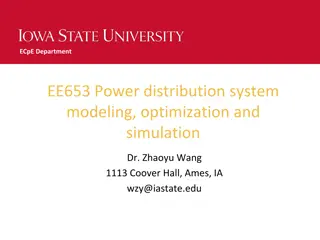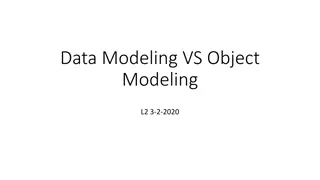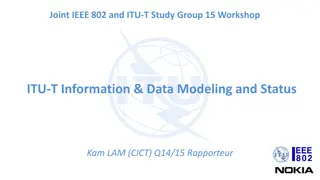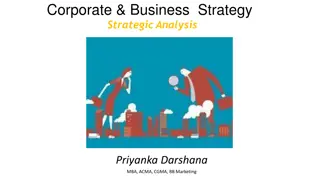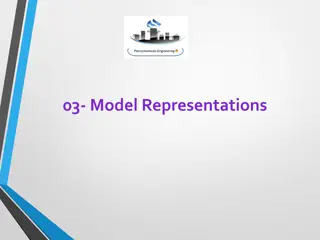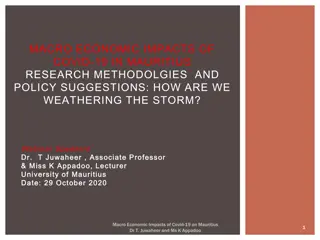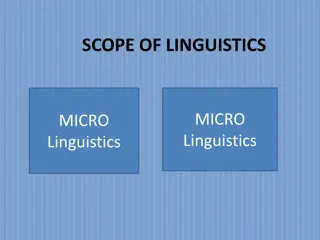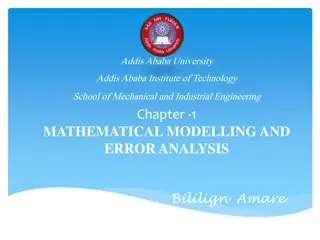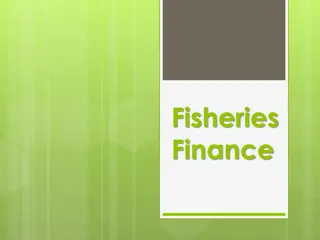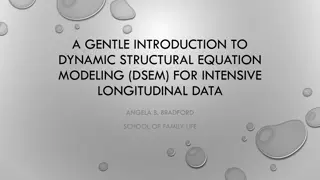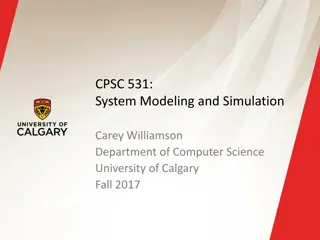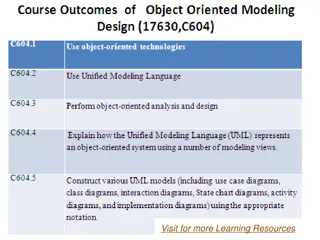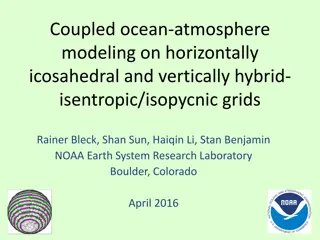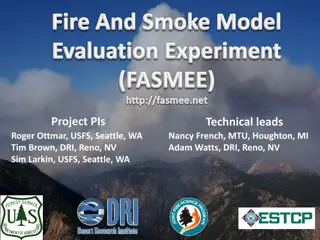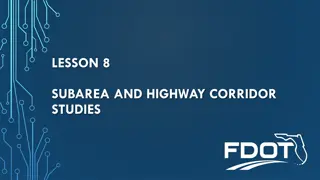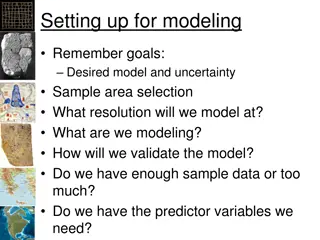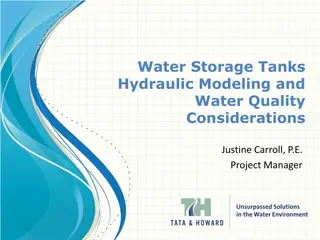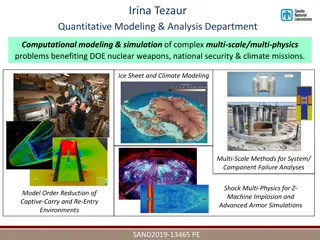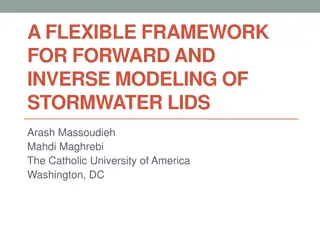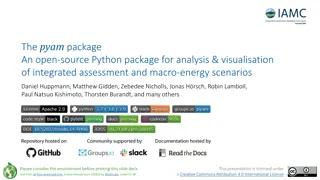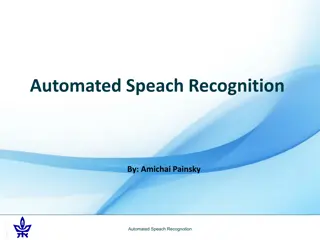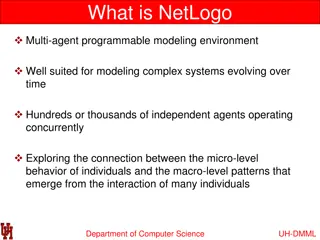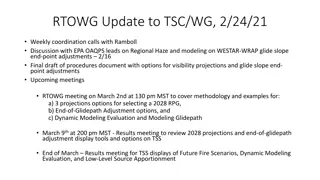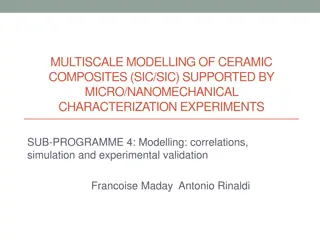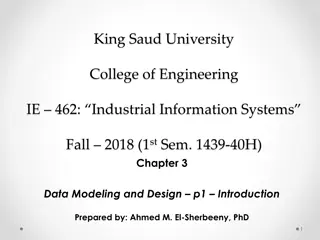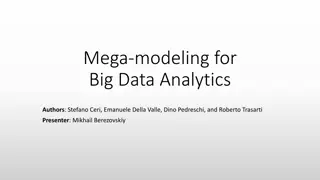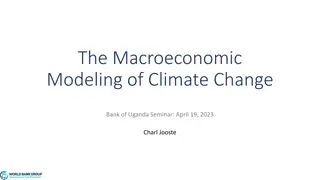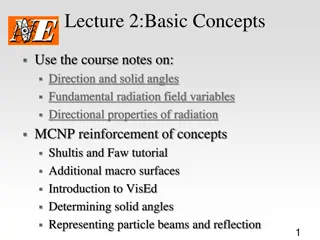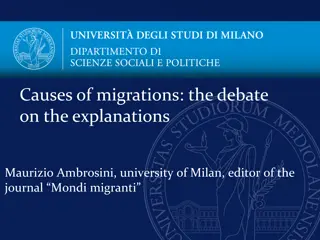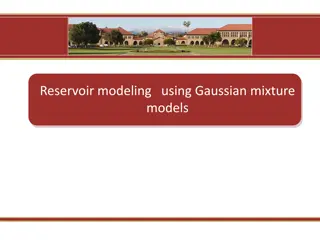Digital marketing fundamentals
The digital marketing environment encompasses both micro and macro elements that influence how organizations operate in the marketplace. Micro-environment focuses on stakeholders and interactions, while macro-environment considers broader forces such as economic, political, and technological influen
0 views • 21 slides
Understanding Macro Economics: Importance and Significance
Macro economics, a vital field originating with the Mercantilists and further developed by J.M. Keynes, focuses on studying the economy as a whole. It encompasses aggregates like national income, employment, output, and investment, providing insights into economic fluctuations, unemployment, inflati
1 views • 6 slides
Overview of Army Modeling and Simulation Office
The U.S. Army Modeling and Simulation Office (AMSO) serves as the lead activity in developing strategy and policy for the Army Modeling and Simulation Enterprise. It focuses on effective governance, resource management, coordination across various community areas, and training the Army Analysis, Mod
1 views • 8 slides
Evolution of Modern State: Three Macro-Patterns Explored
The evolution of the modern state is influenced by three key macro-patterns: War and Militarism, Emergence of Capitalism, and Struggle for Citizenship. These patterns involve deep processes of change over long periods, contributing to the development of modern liberal democratic states. War and Mili
0 views • 13 slides
Understanding Graphing Interactions Using the PROCESS Macro in SPSS
Explore how to graph interactions using the PROCESS macro in SPSS for moderation models without mediation. Learn about installing the PROCESS macro, downloading datasets, SPSS commands in the log file, and defining interaction terms in regression models. Utilize resources like the PROCESS macro webs
1 views • 140 slides
Capacity Zone Modeling for Forward Capacity Auction 17 Results
This presentation unveils the Capacity Zone modeling calculations for Forward Capacity Auction 17 associated with the 2026-2027 Capacity Commitment Period by ISO-NE PUBLIC. It delves into boundary definitions, import-constrained zone modeling, and market rules guiding the assessments and modeling pr
0 views • 16 slides
Distribution Feeder Modeling and Analysis Overview
This document delves into the modeling, optimization, and simulation of power distribution systems, specifically focusing on Distribution Feeder Modeling and Analysis. It covers the components of a typical distribution feeder, series components, Wye-Connected Voltage Regulator modeling, and equation
0 views • 14 slides
Understanding Data Modeling vs Object Modeling
Data modeling involves exploring data-oriented structures, identifying entity types, and assigning attributes similar to class modeling in object-oriented development. Object models should not be solely based on existing data schemas due to impedance mismatches between object and relational paradigm
0 views • 17 slides
Evolution of Modeling Methodologies in Telecommunication Standards
Workshop on joint efforts between IEEE 802 and ITU-T Study Group 15 focused on information modeling, data modeling, and system control in the realm of transport systems and equipment. The mandate covers technology architecture, function management, and modeling methodologies like UML to YANG generat
1 views • 16 slides
Strategic Analysis and Business Strategy Overview
This presentation delves into corporate and business strategy, including strategic analysis, external appraisal, micro, and macro environment analysis. It explores where companies compete, strategic group mapping, market analysis, competitor perception, industry forces, and PESTEL/MACRO analysis, pr
0 views • 26 slides
Understanding Geometric Modeling in CAD
Geometric modeling in computer-aided design (CAD) is crucially done in three key ways: wireframe modeling, surface modeling, and solid modeling. Wireframe modeling represents objects by their edges, whereas surface modeling uses surfaces, vertices, and edges to construct components like a box. Each
1 views • 37 slides
Macro-Economic Impacts of COVID-19 in Mauritius: Research Findings and Policy Recommendations
The webinar conducted by Dr. T. Juwaheer and Ms. K. Appadoo from the University of Mauritius shed light on the significant macro-economic impacts of COVID-19 in Mauritius. They discussed the current status, negative impacts on various industries, industries likely to receive boosts, and key facts an
0 views • 16 slides
Overview of Micro and Macro Linguistics
Micro linguistics focuses on the scientific study of speech sounds, word formation, syntax, and meaning within a language, while macro linguistics delves into the societal, psychological, and neurological aspects of language use. Micro linguistic areas include phonetics, phonology, morphology, synta
1 views • 7 slides
Mathematical Modeling and Error Analysis in Engineering
Mathematical modeling plays a crucial role in solving engineering problems efficiently. Numerical methods are powerful tools essential for problem-solving and learning. This chapter explores the importance of studying numerical methods, the concept of mathematical modeling, and the evaluation proces
0 views • 10 slides
Understanding Fisheries Finance: Macro vs. Micro Level Perspectives
Fisheries finance involves studying the financial aspects of the fishing and aquaculture business. It can be approached at both macro and micro levels, focusing on raising funds, lending procedures, and individual enterprise financial management. Macro-finance deals with the aggregate financial need
0 views • 27 slides
Introduction to Dynamic Structural Equation Modeling for Intensive Longitudinal Data
Dynamic Structural Equation Modeling (DSEM) is a powerful analytical tool used to analyze intensive longitudinal data, combining multilevel modeling, time series modeling, structural equation modeling, and time-varying effects modeling. By modeling correlations and changes over time at both individu
0 views • 22 slides
System Modeling and Simulation Overview
This content provides insights into CPSC 531: System Modeling and Simulation course, covering topics such as performance evaluation, simulation modeling, and terminology in system modeling. It emphasizes the importance of developing simulation programs, advantages of simulation, and key concepts lik
0 views • 28 slides
Understanding Object Modeling in Software Development
Object modeling is a crucial concept in software development, capturing the static structure of a system by depicting objects, their relationships, attributes, and operations. This modeling method aids in demonstrating systems to stakeholders and promotes a deeper understanding of real-world entitie
1 views • 65 slides
Exploring the Fascinating World of Macro Photography
Dive into the captivating realm of macro photography and learn about capturing extreme close-up shots of tiny subjects and living organisms like insects. Follow step-by-step guidance to create an inspiration page filled with mesmerizing macro images sourced online. Unleash your creativity and discov
0 views • 5 slides
Coupled Ocean-Atmosphere Modeling on Icosahedral Grids
Coupled ocean-atmosphere modeling on horizontally icosahedral and vertically hybrid-isentropic/isopycnic grids is a cutting-edge approach to modeling climate variability. The design goals aim to achieve a global domain with no grid mismatch at the ocean-atmosphere interface, with key indicators such
1 views • 21 slides
Fire and Smoke Modeling Evaluation Effort (FASMEE) Overview
FASMEE is a collaborative project aimed at assessing and advancing fire and smoke modeling systems through critical measurement techniques and observational data. Led by key technical leads, FASMEE focuses on diverse modeling areas such as fire growth, effects, coupled fire-atmosphere behavior, smok
5 views • 30 slides
Subarea and Highway Corridor Studies: Travel Demand Modeling and Refinements
In this lesson, we delve into subarea and corridor studies focusing on travel demand model refinements, highway network coding, corridor congestion relief, and trip assignment theory. Subarea modeling plays a crucial role in forecasting travel within smaller regions with detailed traffic patterns, t
1 views • 45 slides
Essential Steps for Setting up a Modeling Study
Ensure clarity on modeling goals and uncertainties. Select sample areas strategically based on interest and available data. Determine appropriate resolution for modeling. Define variables to model and validate the model effectively. Assess sample data adequacy and predictor variables availability. E
0 views • 9 slides
Water Storage Tanks Hydraulic Modeling and Water Quality Considerations
This presentation by Justine Carroll, P.E., Project Manager, focuses on the hydraulic modeling and water quality considerations related to water storage tanks. It covers topics such as water age evaluation, steady state modeling, extended period simulations, pump controls, demand patterns, EPS verif
0 views • 34 slides
Advancing Computational Modeling for National Security and Climate Missions
Irina Tezaur leads the Quantitative Modeling & Analysis Department, focusing on computational modeling and simulation of complex multi-scale, multi-physics problems. Her work benefits DOE nuclear weapons, national security, and climate missions. By employing innovative techniques like model order re
0 views • 6 slides
Flexible Framework for Stormwater Lids Modeling
A new flexible framework for forward and inverse modeling of stormwater lids is presented. It includes governing equations, hydraulic and contaminant transport, numerical methods, and demonstration cases for various green infrastructure components. The importance of different processes in modeling i
0 views • 20 slides
Sustainability and Organic Livestock Modeling for Global Food Security
The research presented at the 18th Organic World Congress in Istanbul delves into the Sustainability and Organic Livestock (SOL-m) modeling approach developed by FAO and FiBL. The study aims to explore the potential impacts of global conversion to organic livestock production by 2050 on food securit
0 views • 25 slides
Overview of the pyam Package for Integrated Assessment and Macro-Energy Scenarios
The pyam package is an open-source Python tool for analysis and visualization of integrated assessment and macro-energy scenarios. Developed by a team of contributors, it provides a workflow from model to insight, supporting various data models and file formats. With features for data processing, va
0 views • 5 slides
Understanding Automated Speech Recognition Technologies
Explore the world of Automated Speech Recognition (ASR), including setup, basics, observations, preprocessing, language modeling, acoustic modeling, and Hidden Markov Models. Learn about the process of converting speech signals into transcriptions, the importance of language modeling in ASR accuracy
0 views • 28 slides
Understanding NetLogo: A Multi-Agent Modeling Environment
NetLogo is a versatile multi-agent programmable modeling environment ideal for simulating complex systems with hundreds or thousands of agents. It explores the connection between individual behavior and emergent macro-level patterns, offering an easy-to-use application development environment with a
0 views • 22 slides
Update on Modeling and Coordination Discussions
Weekly coordination calls with Ramboll and discussions with EPA OAQPS leads focused on Regional Haze and modeling adjustments. Final draft of procedures document with visibility projections and glide slope adjustments. Upcoming RTOWG meetings covering methodology, projections, and modeling evaluatio
0 views • 5 slides
Advances in Ceramic Composite Property Modeling and Experimental Characterization
European research focuses on advanced modeling of C/C, C/SiC, and SiC/SiC composites for aerospace and nuclear applications, with an emphasis on correlating simulations with experimental validation. Laboratories are progressing towards a multiscale approach, integrating micro/nanomechanical characte
0 views • 5 slides
Importance of Data Modeling in Industrial Information Systems
Introduction to data modeling and design in Industrial Information Systems at King Saud University College of Engineering. The chapter covers the significance of data modeling, capturing data characteristics, structural information, and the role of databases and DBMS. Data modeling fills crucial gap
0 views • 51 slides
Mega-Modeling for Big Data Analytics
Mega-Modeling is a comprehensive approach that encompasses model construction, evaluation, composition, evolution, and search to address challenges in various areas such as social and economic resilience, health, transportation, and energy management. The pillars of Mega-Modeling include Model-Drive
0 views • 14 slides
NetLogo - Programmable Modeling Environment for Simulating Natural and Social Phenomena
NetLogo is a powerful and versatile programmable modeling environment created by Uri Wilensky in 1999. It allows users to simulate natural and social phenomena by giving instructions to multiple agents operating independently, making it ideal for modeling complex systems evolving over time. NetLogo
0 views • 7 slides
Macroeconomic Modeling of Climate Change in Policy Making
In this seminar by Charl Jooste at the Bank of Uganda, the discussion revolves around the essential ingredients for macro models to incorporate climate policy and climate change. The talk highlights the need to augment standard macroeconomic functions, react to price signals, and link macro models w
0 views • 48 slides
Radiological Concepts and Macro Surfaces Overview
Explore basic concepts in radiation science such as direction, solid angles, field variables, and directional properties along with practical applications in modeling macro surfaces like spheres, cylinders, cones, and tori. Use resources like course notes, Shultis and Faw tutorials, and MCNP for rei
0 views • 17 slides
Analysis of Quranic Macro Text Features and Occurrences
This detailed analysis delves into the various features and occurrences of macro text in the Quran, exploring different types of Quranic sentences, repetitions, formulas, epithets, leitmotifs, parables, premises, deductive arguments, and more. The study also examines thematic coherence, mutashabihat
0 views • 39 slides
Debates on Migration Causes: Macro vs. Micro Explanations
Causes of migration are debated between macro-structural and micro-subjective perspectives. Macro explanations focus on push factors like overpopulation and poverty, while micro explanations view migration as rational choices. The debate also includes meso-social factors such as migrant networks and
0 views • 13 slides
Reservoir Modeling Using Gaussian Mixture Models
In the field of reservoir modeling, Gaussian mixture models offer a powerful approach to estimating rock properties such as porosity, sand/clay content, and saturations using seismic data. This analytical solution of the Bayesian linear inverse problem provides insights into modeling reservoir prope
0 views • 10 slides
